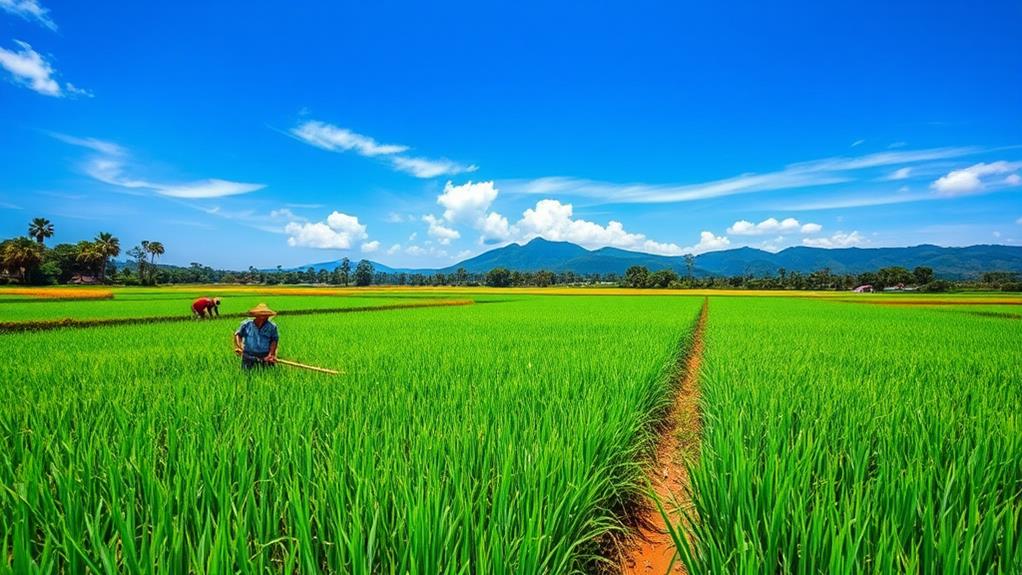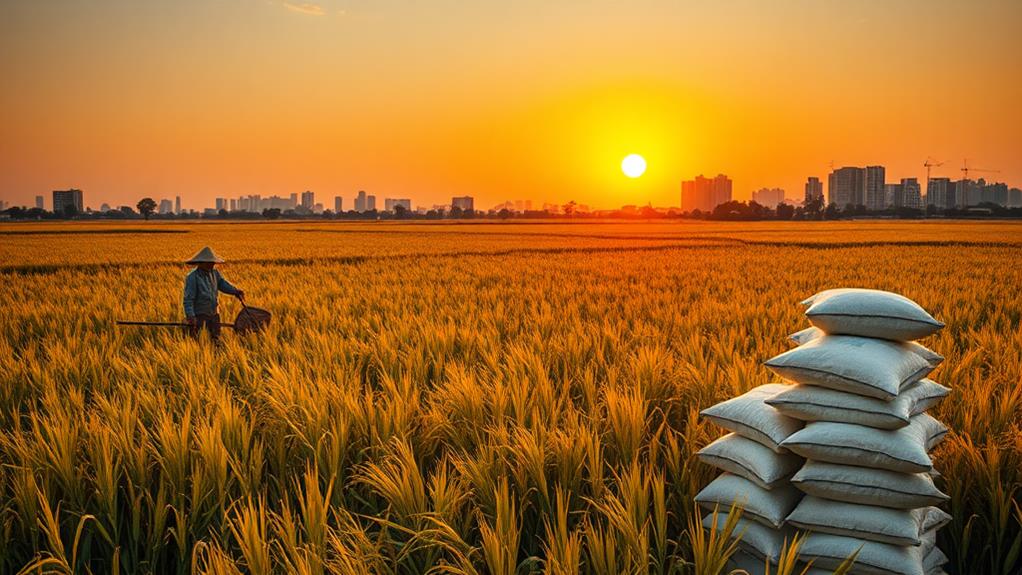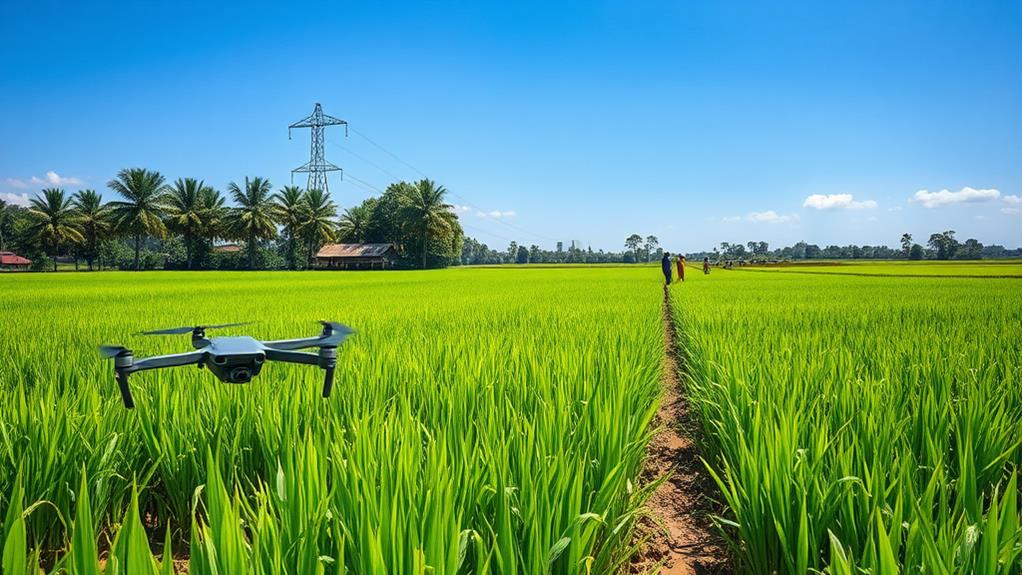The Philippine rice industry is vital for feeding the nation and ensuring food security. However, it faces serious challenges.
There are 2.4 million rice farmers, and the average age of these farmers is 56 years old. This older demographic may lead to labor shortages in the future.
The country is also the world's largest rice importer. This means it is struggling to keep up with rice demand. As a result, rice prices have increased to a 15-year high. Farmers earn only about $294 per hectare, which is not enough to cover their rising costs.
To address these issues, the government is trying to encourage younger people to enter farming. They are offering incentives and creating educational programs to make farming more appealing.
These initiatives could help improve rice production in the future.
Current State of Rice Farming

Rice farming in the Philippines faces serious challenges, even though it's important for the economy and culture. About 2.4 million Filipinos work as rice farmers, providing essential jobs for many families.
However, the average age of these farmers is 56, indicating an aging workforce that may lead to future labor shortages.
Rice isn't just food; it's a vital part of Filipino culture, as shown in the saying "Bigas ay buhay," which means "Rice is life." Unfortunately, the Philippines has become the world's largest rice importer, meaning that local rice production isn't meeting the high demand.
Recently, rice prices have surged to a 15-year high, raising concerns about food security.
To address these issues, the government has made policy changes aimed at stabilizing the rice industry. These changes are important for protecting the jobs of rice farmers and ensuring that everyone has enough food to eat.
It's crucial to tackle these problems to create a stronger rice sector that can handle economic and demographic challenges.
Challenges for Farmers
Filipino rice farmers face serious challenges that affect their ability to succeed. The average income for rice farmers is only $294 per hectare each crop season, which isn't enough to cover increasing costs.
The average age of farmers is 56 years, raising concerns about the future of rice farming. Younger people often view farming as hard work with little reward, making them less likely to join the profession. This leads to labor shortages and puts more stress on the remaining farmers.
Climate change worsens these challenges. Events like Typhoon Karding can destroy crops and contribute to a food crisis, threatening food security in the country.
Farmers also struggle with limited access to modern farming technology and insufficient government support, which makes it hard to produce rice sustainably and compete globally.
Without specific policies and investments to address these issues, farmers may find it difficult to keep their businesses running, putting both their livelihoods and the nation's food supply at risk.
Economic Pressures on Agriculture

Filipino rice farmers face serious economic pressures that affect their ability to succeed. They earn an average of only $294 per hectare each growing season, which isn't enough to cover rising costs and fluctuating market prices. The government has set a price ceiling on rice to help consumers, but this limits how much farmers can earn, making it even harder for them to survive financially.
In places like Nueva Ecija, land prices are increasing due to commercial development, making it tougher for farmers to profit. Additionally, the average age of rice farmers is 56 years old, and younger people aren't interested in farming because they see it as a low-paying job. This trend could lead to a labor shortage in rice farming, which threatens food security.
Moreover, there's a lack of government support and limited access to modern farming tools, which makes it difficult for rice farming to be sustainable.
To help the rice industry thrive and ensure the country has enough food in the future, it's important to tackle these economic challenges.
Changing Perceptions of Farming
Many Filipino rice farmers, who average 56 years old, believe it's important to change how people view farming. The youth are increasingly hesitant to choose farming as a career because they see it as hard work with little reward. This negative view not only discourages current farmers but also makes young people less interested in carrying on family farming traditions.
To address this issue, programs like PhilRice's "Anak ako ng magsasaka" aim to promote pride in farming and show that it can be a good career choice. These initiatives seek to change the story around rice farming to attract young people back to this field.
Educational programs and government incentives are also important for improving the image of farming careers and encouraging more young people to get involved.
However, there are still significant challenges. Farmers often feel disheartened, so it's essential to create a supportive environment that highlights the possibilities in agriculture.
How Does Youth Empowerment Impact the Future of the Philippine Rice Industry and Food Security?
Youth empowerment in philippines future plays a crucial role in shaping the future of the rice industry and food security. By providing the youth with the necessary skills and resources, they can become valuable contributors to sustainable agricultural practices, technological innovation, and community development, ultimately ensuring a stable food supply for the country.
Innovative Solutions and Initiatives

Innovative solutions and initiatives are important for improving the Philippine rice industry and attracting young farmers. Programs that promote new farming techniques are necessary to change the aging farmer population. An example is PhilRice's "Anak ako ng magsasaka," which aims to make agriculture seem like a good career choice.
| Initiative | Focus Area | Expected Impact |
|---|---|---|
| Educational Campaigns | Youth Engagement | Increased interest in farming |
| Government Incentives | Financial Support | More young farmers entering the field |
| Technological Advancements | Productivity Enhancement | Improved crop yields and sustainability |
Government incentives help young farmers by providing financial support, which can make agriculture more appealing. Technological advancements like smart irrigation and disease monitoring tools improve farming efficiency and contribute to food security.
Collaborations between agricultural groups and local farmers help share success stories and best practices. These innovative methods focus not only on better farming but also on ensuring a stable food future for the Philippines.
Future of Food Security
To secure food in the Philippines, action is needed now. The Philippines imports more rice than any other country, even though it's the eighth largest producer. Improving local rice production is crucial. As the population grows, the demand for rice will increase. Therefore, long-term plans for farming that include different crops will help reduce reliance on rice as the main food source.
Climate change poses a major threat to rice farming, especially for small farmers who can't afford to adapt. Innovative farming methods and government support can help these farmers withstand climate challenges.
Working with ASEAN countries on food security is also important. For example, countries can stockpile rice and explore trade options to prevent shortages.
Using sustainable farming practices like those from the Sustainable Rice Platform (SRP) can boost rice production and improve farmers' lives. These methods not only help with food security but also protect the environment.
Questions and Answers
How Does Rice Contribute to Food Security?
Rice is important for food security because it provides essential nutrition. Different types of rice can meet various dietary needs. For example, brown rice is high in fiber and vitamins, while white rice is a quick energy source. Using sustainable farming practices helps farmers grow more rice without harming the environment. Supportive government policies can provide resources like funding and training for farmers, leading to higher rice production. This means that communities have access to a steady supply of rice, which keeps prices affordable and ensures everyone can get this important food.
What Is the Philippines Doing About Food Insecurity?
The Philippine government is working on agricultural policies to boost food production. These policies aim to make farming more efficient and increase the amount of food available. For example, the government supports farmers by providing better seeds and training.
In addition to boosting production, the government has community programs to improve food distribution. These programs help get food to people who need it most, particularly in areas that struggle with access to food. For instance, local markets and food banks are strengthened to ensure food reaches families.
Why Is Rice Important in the Philippines Economy?
Rice production is very important for the economy of the Philippines. It helps create jobs in rural areas and supports economic stability. By improving agricultural policies, the country can increase local rice yields. This means farmers can grow more rice, which helps the country rely less on imported rice. For example, if the government provides better seeds and training for farmers, they can produce enough rice for local needs. This leads to better livelihoods for farmers and ensures that all citizens have access to food.
What Are the Factors That Affect Food Security in the Philippines?
To improve food security in the Philippines, climate change must be considered because it affects crop yields. For example, changing weather patterns can lead to droughts or floods, harming farmers' harvests.
Next, the effectiveness of agricultural policies needs to be evaluated. Policies should support sustainable farming practices to increase food production.
Additionally, market access for farmers must be enhanced. Farmers should have better access to markets to sell their products at fair prices. This can be achieved by improving transportation and building local markets.